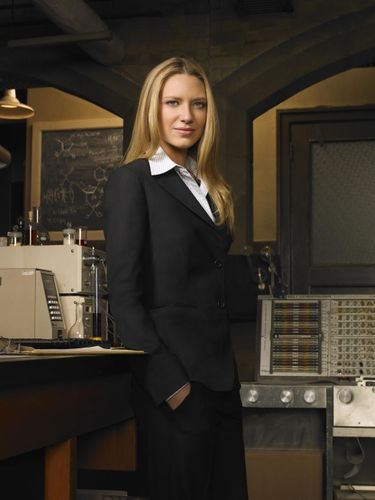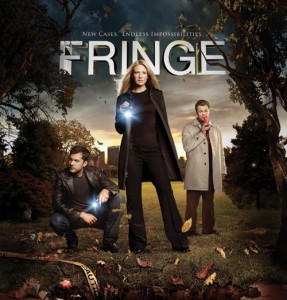
October 19, 2009
adventures with badass sistahs in outer space: olivia dunham
Posted by dogpossum on October 19, 2009 9:43 PM in the category academia and buffy and angel and digging and fringe and teaching and television and veronica mars | Comments (1)
I love SF telly. I love it. I watch every SF program, just in case. I also like supernatural, fantasy and general make believe stuff.
But I tend to have less patience with programs that do not have good female characters. I make exceptions for programs like Supernatural which explore male characters and masculinity in new ways.
I love all trashy vampire telly. I can't help it. It's a sickness.
I did my honours thesis on female violence in action film, and I'm still interested in the way women and violence and, more importantly, women's violence are depicted in mainstream film and television. While I was doing this honours project I came across an article which basically argued that straight-to-video releases (ie B films) were often more transgressive in terms of representations of gender than mainstream or A films. I am really interested in this idea. This is partly how I justify my passion for B telly. Partly. But I also think it's true. Telly that doesn't gain broadcast telly release, doesn't make it to prime time, or even make it to Australian television tends to be where I find the most interesting gender stuff. It's as though being B gives you a little freedom to explore different types of characters.
I gain access to these programs through the internet, and through video shops. Video shops are actually very important. DVD releases of even the most B programs has given me access to some of the most wonderfully un-top-shelf television. Accessing these programs this way (rather than via broadcast telly) means that I tend to watch them in a block, rather than one episode-per-week. I binge view. This changes the way that I read these programs. It makes me more likely to read the meta-arc, the larger story. I tend to regard individual episode stories as pieces of a whole, rather than as discrete texts. Even when the program is very 'monster of the week' (as most SF is, particularly in its first season).
I find out about these programs via websites like io9. I use wikipedia extensively to clear up plot points I haven't understood or to follow up characters and add-on texts like comics. I also use imdb for details about directors, actors and so on. I like to talk about these programs with other people, but I don't particularly want to sit down and dissect them for hours. This was something I used to do with Buffy when I was at school. These days I quite like to share programs and to mention them, or to share add-on texts, but I'm really only interested in watching them. I do talk about them with my partner when we're watching. But only the programs he's also interested in.
My PhD dissertation involved a lot of research into fan studies and methodologies and theories involved in researching fan cultures. I am self-reflexive about most of my talk about these SF telly shows. I am interested in issues of gender and class and sexuality and race and ethnicity.... and all that good identity stuff. But I am also interested in questions about technology and machinery, wider questions about humanity. But, really, gender is where it's at; all that other shit is inflected by this. And, as somebody clever said once, I'll be a post-feminist when we live in a post-patriarchy. Gender issues are so central to SF culture and texts, it's ridiculously self-deceiving to try to ignore them.
This is just one post about one character (mostly) that I like. I'll try to write other posts about other characters. And perhaps about this program in more detail. But don't count on it; I'm slack.
Because I tend to watch a number of programs at one time, and am also reading SF all the time, I tend to read intertextually. Well, of course I do. We all do. But this is one of my particular pleasures; I like to imagine characters from different programs meeting. I like exploring the industrial connections between programs - how could the director of Veronica Mars move to Moonlight and what happens when Mark Mothersbaugh does the music for Big Love. Oh - I also read and watch across genres. I'm reading lots of dodgy supernatural romances most of the time, and always reading Tanya Huff; I'm watching programs like Vampire Diaries and, of course, Blood Ties.
So when I'm watching these programs I'm not only reading the text in front of me, I'm also thinking intertextually, I'm thinking about modes and industries of production, and I'm paying attention to audiences and modes of reception. And the communities which tie them all together.
And I re-watch and re-read on a massive scale.
I also do some sessional teaching at various universities. I exploit this role by pushing the television I love on young, vulnerable middle class kiddies. I do, unapologetically and with great verve, present these programs in a feminist light. I have no - as in zero - tolerance for anti-feminist arguments from my classes. I will listen to them and then dismiss them as they deserve. I aim to indoctrinate a generation of students. They will be feminist and they will value SF.
They can just suck it up or fail.
So here's some stuff about Olivia Dunham. Main character of Fringe. All-round badass sistah. Mos def.
First, watch this:
That's a Fringe promo. The blonde is Olivia Dunham.
I'm really liking the character Olivia Dunham in Fringe. I especially liked her in the first season of the program. Why?
She's a crack shot. She is really, really good with a gun.
She's a good fighter. She wins most fights, and when she doesn't win, it's only because her opponent is, I dunno - a car or something.
She's super clever and figures things out. There are lots of things to figure out in Fringe.
She's a good explainer. Because she's a good figure-er-outer, she often has to explain things to other characters. Usually her male partner Charlie, but also quite often her boss.
She listens and thinks and listens again. She's not always flapping her lips, yapping. She's listening.
She's a good runner and jumper.
She's very gentle and patient with Walter, who's not only a habitual drug user (and abuser) but a mentally unwell older man who's been quite seriously damaged by his time in an institution. She listens to him and pays attention to him; she doesn't patronise him. She protects him when he needs it (and when he asks), but she is also willing to let him take care of himself.
She used to be a prosecutor in the military. She investigated and then prosecuted a middle aged white man who later became her boss. He was charged with sexually assaulting a number of women. When he became her boss, he sought revenge on her through systematic harassment. She didn't take that crap; she kept on being a badass agent. She didn't martyr herself; she called him on his bullshit. Her usual boss was this bad boss's friend. At first he didn't want to like Olivia because of this. Eventually he figured out Olivia was a gun, and that his friend was crap. Then he became a better boss. Olivia kept on being a gun, regardless.
She's willing to tell bosses off if they need it. She's also prepared to listen and to admit she was wrong.
She really likes her sister and her little niece.
She had good, solid, platonic relationships with her male coworkers. There is never even the intimation of sexual tension between her and (the awesome) Charlie. They are partners in the truest sense. He has a wife he loves and Olivia is busy being... Olivia.
She operates in an all-male world - the FBI (or is it CIA? Whatevs - some institution) - but she is aware of gender issues and articulates them. Most especially in her dealings with the bad boss. But she also makes comments about men in positions of power who can't handle assertive women. She has one great line in the first season about how the men around her (especially her male boss) aren't listening to her because she's 'getting emotional, just like a woman'. And then she says something, very sternly, about how she is getting emotional, because this is emotional stuff, and that this emotion is making her a better agent. Olivia is not only calling the men around her on their mysogynist bullshit, she's also reworking the role of 'great agent' to incorporate a range of characteristics not traditionally located in the male arse.
And she is a fully sick agent.

Throughout season one she is the main character. She is the centre of stories, and as the agent in charge, she is also boss of the cases they work. She's the one to call the lab and tell them to get their gear and come investigate something gross. This changes a little in season two, and she is set up as something of a victim (recovering from a 'car accident'), but this is changing. We are at about episode four, and she's already back on her feet and kicking arse. Peter has taken on a more managerial role in the group, and the 'Fringe division' has officially been disbanded. Charlie has [SPOILER] died [/SPOILER], which sucks arse, but I'm dealing. So Olivia's status has shifted. But this is ok, as Peter's character has only slowly been working away from 'carer' for Walter and 'general slacker' towards some sort of three dimensional personhood. He's also finally realising his abilities as an investigator type person. In other words, his character is gradually being fleshed out. I worry that he'll become Olivia's partner (in the sense of FBI ness and in the romantic sense), but I don't see this happening any time soon.
I really like Olivia because I don't worry about her. She's kind of superhuman, but only in the way we expect our SF protagonists to be. She gets scraped and banged and shot occasionally, but it doesn't stop her winning. Sure, she's kind of a paragon of all things awesome, but this is as it should be in SF. She is, however, flawed. And [SPOILER] probably partly psychic and awesome because she was experimented on as a kid. But she has begun dealing with this history and is assimilating and coming to terms with its effects in a phenomenally healthy way. Which in itself is a bit worrying.
Olivia is an impossible woman. An impossible character. But this is as it should be in SF. This is how SF protagonists are: they are strong and brave and clever. Cleverness is important. She is conventionally attractive, but she doesn't wear booby shirts or stupid shoes. She can run like a badass mofo and she likes suits. Just like the male agents around her. She wears her hair tied back in a piggy tail, or she wears a sensible black beanie. She doesn't wear much make up. She is conventionally attractive. But so are most protagonists.
I <3 Olivia.

Olivia isn't the only woman character in Fringe worth loving. I also love Astrid, who's the agent assigned to working with Walter in his lab.
Astrid is also awesome.
She has a degree in cryptography, another in computer stuff (or is that a double major) and she's got some sort of medical training (well, she does now). She loves cryptography. As in, she's a nerd for it. And she loves computers.
She's also an agent.
She calls Walter on his bullshit, including his inability to remember her name (which we suspect is a ploy on Walter's part). She won't let him (or anyone else) forget that she is actually a badass agent as well.
She deals with Walter's gross dissections and experiments very matter of factly.

She runs errands and also has some badass ninja agent skills.
She veers into 'servant territory' every now and then, which is particularly worrying as she's African American. But these little deviations are usually addressed: Astrid will call bullshit on Walter's behaviour and regularly refuses tasks she feels cross the boundary from professional assistance to nurse maiding.
She is super smart.
She and Olivia talk regularly about things other than men. They often figure out puzzles together.

She is fond of Walter and also deals with his mental illness and fragile personality gently, yet without patronising him. She does not take on a carer role; she is, if nothing else, Walter's lab assistant.
Nina Sharp is another important female character in Fringe. She's the CEO of Massive Dynamic, a sort of super-corporation specialising in technology. A bit like Skynet Cyberdyne Systems, but awesomer. She admires Olivia greatly and has tried to recruit her to Massive Dynamic a number of times. She and Olivia have a refreshingly realistic relationship; they deal with each other as professionals. They do not have the sort of antagonistic rivalry alpha women are usually given in SF... in telly.They talk to each other about plenty of things besides men. They often talk about technology together. And science.
Nina Sharp is middle aged.
Nina Sharp has a bionic arm and a clear glass ipod thingy. She is way cool with technology generally. This is one middle aged woman who is not relegated to earth mother status; she is technology, economic and industrial power and smarts.
I love Olivia the most, though. I love the way she stops and thinks about things. I love the way she can fighty fight. I love it that though she might, one day be interested in Peter romantically, that day is waaaaaay off in the future, and for now she's busy being a badass. He thinks she's neat. He might think she's neat in a romantic way, but for now he just thinks she's a badass and he wants to be her partner, I think.
So I love Olivia Dunham. And this is why I can watch Fringe.
PS: I'll try to add some more pics to this later, when I can figure out how to do it in this new version of MT without opening a new stupid window every time.
EDIT: I had to add this link to a drawing Jasika Nicole (the actor who plays Astrid) drew of herself.





Comments
Posted by: Glen at October 20, 2009 11:55 AM
Wow, good post. I also enjoy Fringe and have got M. watching it too. (In fact, M. kind of reminds me of Olivia, in that badassy, professional-woman-being-strong/independent/caring/emotional/smart/attractive/etc, but don't tell her that;)
Posted by: Glen at October 20, 2009 11:55 AM
Post a comment